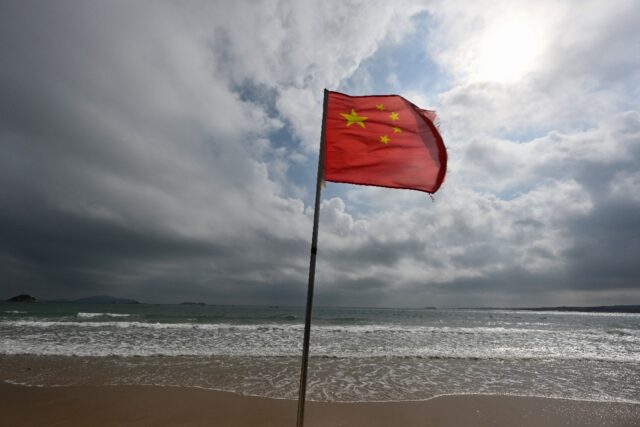People on both sides of the fraught Taiwan Strait pinned their hopes this week on peace, after Beijing launched military drills around the self-ruled island.
China on Monday sent fighter jets, bombers and warships to encircle Taiwan, in exercises it dubbed a “stern warning” to “separatist forces” on the island.
But in mainland China’s county of Pingtan — at some points just 68 nautical miles (126 kilometres) from Taiwan’s main island — small business owners said they hoped relations would improve, if only to help boost their struggling local economy.
Many only gave their surnames, highlighting just how sensitive the issue of Taiwan has become in China.
Pingtan and Taiwan enjoy close cultural and familial ties — elderly locals talked fondly of family members on the island or those who had lived there previously.
So close are the landmasses, one octogenarian told AFP, that on a clear night it is possible to see the lights of Taiwan twinkling across the strait.
One beach seller hawking sandals and buckets said Taiwanese tourists used to be a common sight but not any more.
And at a local “Taiwan Town” — a duty free shopping area mainly for goods from the island — many shops were boarded up.
“The relationship between the two sides has a definite impact on business,” shop owner Chen told AFP.
“Before it was very lively, but in the last few years it’s gotten worse,” she explained.
Another shopkeeper, who declined to give her name, also echoed complaints that the local economy had struggled because of the cross-strait acrimony.
But despite the tensions, Chen was optimistic about prospects for unification.
“If we reunite we’ll have one country, two systems, so it won’t impact our duty free business,” she said — a reference to Beijing’s claim that Taiwan would be able to retain its political system even after unification.
On Taiwan-controlled Nangan island, less than 30 kilometres from mainland China, one person said Monday’s drills amounted to “military intimidation” by Beijing.
“We cannot say we are used to it; we hope for peace across the strait, as it is the most crucial factor for the development of both sides,” Chien Chun-te, a 46-year-old breakfast shop owner said.
“These activities around Taiwan are not taking place for the first time,” he said.
‘War is no good’
Late on Monday Beijing wrapped up its “Joint Sword” drills, declaring it had “fully tested the integrated joint operation capabilities of its troops”.
People in Nangan said they had not seen Chinese warships.
And one told AFP he didn’t believe China would attack — as long as Taiwan’s ruling Democratic Progressive Party “doesn’t provoke them”.
“We’re all one family,” Chen Sai-ching, a farmer, said.
“War is no good.”
On Pingtan, there were also few signs that drills had taken place.
But restaurateur Hu Fengping said she did occasionally worry about an armed conflict.
“Of course I think about war, I saw in the news other places where there’s war, there are children dying, but I don’t think that will happen to China,” she said.
“A war would affect everyone… it would affect business,” she explained.
“I hope we can live peacefully.”
On a nearby beach, one passerby was more hawkish, echoing China’s pledge that it would never renounce the use of force to take the territory.
“Of course we will be united!” 30-year-old Tao, a tourist, told AFP.
“No matter whether it’s by force or peacefully.”
Taiwan’s leadership insists the island is already de facto independent and President Lai Ching-te pledged last week to defend its sovereignty, infuriating China’s leadership, which declared that unification was “inevitable”.
But Tao was sure that when the day came, tensions would melt away.
“All the disagreements and conflicts at the moment will disappear as soon as we’re united, and that will happen.”
burs-oho/mca

COMMENTS
Please let us know if you're having issues with commenting.